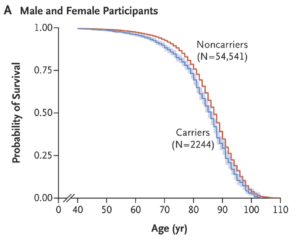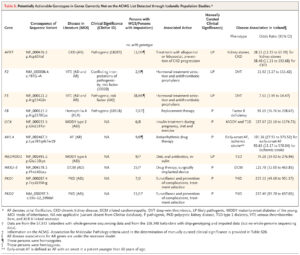“Know Thyself”: How Genetic Testing Can Help Extend Your Lifespan
(Posted on Tuesday, December 26, 2023)
This story is one of many exploring recent advances in the science of longevity and aging. Whereas prior articles in this series have focused on musculoskeletal aging, this article marks a shift toward the topic of genetics. Which genes are involved in aging and longevity? How are they involved? What are the therapeutic implications?
A new study out of Iceland suggests that a group of 10 to 20 disease-causing gene variants can significantly reduce lifespan. The findings, published in The New England Journal of Medicine, emphasize that carriers of such genes may live anywhere from three to 15 years fewer than their noncarrier counterparts. Early screening and early discovery of these harmful genes can help minimize, and possibly prevent, the loss in lifespan.
What are “Actionable” Genes?
The findings rest on a set of genes called “actionable”. In brief, these are genes that are known to increase the risk of a disease for which there is a therapeutic intervention. They are considered actionable because, with the right medical treatment, their negative health effects can be limited or prevented entirely.
The term first gained traction in 2013, after the American College of Medical Genetics and Genomics (ACMG) published guidelines on how to report secondary findings; that is, findings regarding potentially harmful variants of a gene unrelated to the primary objective of testing. A way of keeping tabs on different versions of genes, essentially.
Since then, the organization has updated the list of actionable genes regularly. And in 2021, it announced that the list would be updated once a year, to help stay on top of newly discovered genetic variants with negative health effects. The list includes genes responsible for a vast array of health problems, including cardiovascular, cancer, and metabolic diseases.
(Un)Luck of the Draw
Working with a list of 73 actionable genes released by the American College of Medical Genetics and Genomics in 2021, the researchers studied whole-genome sequences of 58,000 Icelanders. Whole-genome sequencing is a technique that allows scientists to uncover the unique fingerprint of a person’s genetic information. All DNA is made up of four simple nucleotide bases: A, T, C, and G. Whole-genome sequencing presents a snapshot of the order of these bases.
Of the 58,000 participants, 1 in 25 carried actionable genes. Homing in on their effect on longevity, the researchers discovered that cancer-associated actionable genes had the largest impact on life expectancy: a median decrease of three full years. For certain cancer-predisposing genes, such as a pathogenic version of the BRCA2 gene —which is linked to breast, ovarian, and prostate cancer— this number soared to as high as seven years. And a variant of the gene for low-density lipoprotein receptor (LDL-R) reduced life expectancy by six years. This gene is intimately connected to high cholesterol and heart disease.
Carriers of actionable genes were also significantly more likely to die from the disease associated with the gene. For Icelanders who carried the BRCA2 variant mentioned above, the risk of dying from breast, ovarian, or pancreatic cancer was seven-fold higher than the rest of the population. Those with actionable genes are also at a heightened risk of developing prostate cancer and seven times more likely to succumb to the disease than noncarriers.

Figure 1. A graph highlighting the difference in lifespan between carriers of actionable genes and noncarriers. SOURCE: Actionable Genotypes and Their Association with Life Span in Iceland; Jennson et al., 2023
The researchers also uncovered 10 new potentially actionable genes that are not currently listed in the database maintained by the American College of Medical Genetics and Genomics (ACMG). The life-shortening genes are linked to chronic kidney disease, blood clotting, bleeding disorders such as hemophilia, heart-muscle disease, and a rare form of diabetes called maturity-onset diabetes of the young (MODY).

Table 2. List of potentially actionable genes uncovered by the Iceland study. SOURCE: Actionable Genotypes and Their Association with Life Span in Iceland; Jennson et al., 2023
Takeaways
Approximately 4% of the Icelandic population carries actionable genes. Based on large genomic studies, a similar percentage of the population in the United Kingdom and in the United States carry actionable genes. As made clear by this study, such genes can absolutely be life-shortening. But crucially, they needn’t be: population-wide genetic screening can help flag individuals who are predisposed to cancer, heart disease, kidney disease, and so on. Armed with this knowledge, patients and healthcare providers can design disease-prevention and treatment programs tailored to the individual. From heart disease to cancer, early detection and intervention are crucial to improving health outcomes.
We have the tools for large-scale genetic sequencing, and as this study and others like it show, the need for it, what is lacking is political will and policy. Initiatives such as the All of Us research program, founded in the United States in 2015 during Barack Obama’s tenure as president, are a step in the right direction. Still, such programs are currently the exception when they should be the norm. For lack of a better alternative, people frequently turn to at-home testing kits for answers; unfortunately, these are wildly inaccurate. Genetic sequencing needs to become a routine part of medical checkups in early life to help inform patients and devise effective, individualized health programs.
Until then, go out and bother your doctor for a genetic test, it just might give you another three years of life, or six.
This article was originally published on Forbes and can be read online here.

